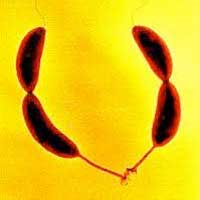 Biochemists at the University of Massachusetts Amherst recently gained new insight into how protein synthesis and degradation help to regulate the delicate ballet of cell division. In particular, they reveal how two proteins shelter each other in "mutually assured cleanup" to insure that division goes smoothly and safely.
Biochemists at the University of Massachusetts Amherst recently gained new insight into how protein synthesis and degradation help to regulate the delicate ballet of cell division. In particular, they reveal how two proteins shelter each other in "mutually assured cleanup" to insure that division goes smoothly and safely.
Mar 6th, 2013
Read more
Scientists are reporting an advance in re-engineering photosynthesis to transform plants into bio-factories that manufacture high-value ingredients for medicines, fabrics, fuels and other products.
Mar 6th, 2013
Read more
Cristian Micheletti, a scientist of the International School for Advanced Studies of Trieste (SISSA), has published in Physics of Life Reviews a review on an innovative instrument for protein analysis, a method for which Micheletti and his research team are a reference point for the international scientific community.
Mar 5th, 2013
Read more
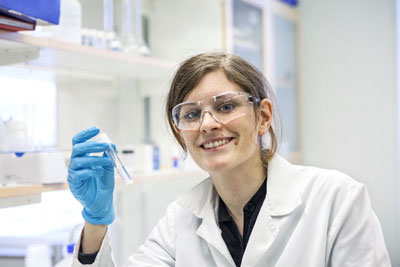 Researchers at KTH Royal Institute of Technology have discovered an antibacterial polymer that can be used in everyday products such as sportswear, diapers and bandages, without causing resistant bacteria.
Researchers at KTH Royal Institute of Technology have discovered an antibacterial polymer that can be used in everyday products such as sportswear, diapers and bandages, without causing resistant bacteria.
Mar 5th, 2013
Read more
Scientists at The University of Manchester have identified the method by which cells control the recycling of molecules, a process that is essential for them to move. The discovery provides researchers with a better understanding of how our bodies heal wounds.
Mar 1st, 2013
Read more
 Researchers have electronically linked the brains of pairs of rats for the first time, enabling them to communicate directly to solve simple behavioral puzzles. A further test of this work successfully linked the brains of two animals thousands of miles apart.
Researchers have electronically linked the brains of pairs of rats for the first time, enabling them to communicate directly to solve simple behavioral puzzles. A further test of this work successfully linked the brains of two animals thousands of miles apart.
Feb 28th, 2013
Read more
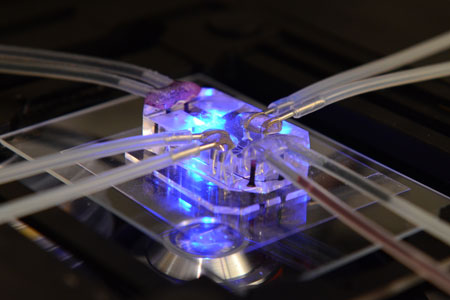 Wyss Founding Director Don Ingber, M.D., Ph.D., received the NC3Rs 3Rs Prize from the UK's National Centre for the Replacement, Refinement and Reduction of Animals in Research (NC3Rs) for his innovative Lung-on-a-Chip - a microdevice lined by human cells that recapitulates complex functions of the living lung.
Wyss Founding Director Don Ingber, M.D., Ph.D., received the NC3Rs 3Rs Prize from the UK's National Centre for the Replacement, Refinement and Reduction of Animals in Research (NC3Rs) for his innovative Lung-on-a-Chip - a microdevice lined by human cells that recapitulates complex functions of the living lung.
Feb 28th, 2013
Read more
 Berkeley Lab researchers produce first step-by-step look at transcription initiation.
Berkeley Lab researchers produce first step-by-step look at transcription initiation.
Feb 27th, 2013
Read more
Scientists are examining a line of "immortal" swine cells that can differentiate into liver cells. These cells could be part of an artificial liver device, which could reduce the need for liver transplants.
Feb 27th, 2013
Read more
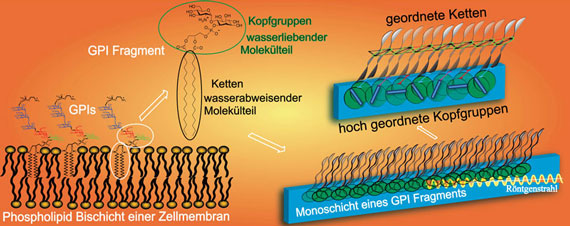 Crystalline areas form in model membranes based on a previously unknown mechanism.
Crystalline areas form in model membranes based on a previously unknown mechanism.
Feb 27th, 2013
Read more
Scientists are testing the power of holography to artificially stimulate cells in the eye, with hopes of developing a new strategy for bionic vision restoration.
Feb 26th, 2013
Read more
Scientists have used sugar-coated scaffolding to move a step closer to the routine use of stem cells in the clinic and unlock their huge potential to cure diseases from Alzheimer's to diabetes.
Feb 26th, 2013
Read more
Scientists have developed an algorithm to predict how much can be learned in a large-scale DNA sequencing experiment -- with potential applications in every field of science.
Feb 24th, 2013
Read more
Researchers at the University of Wisconsin-Madison have found a new way to accelerate a workhorse instrument that identifies proteins. The high-speed technique could help diagnose cancer sooner and point to new drugs for treating a wide range of conditions.
Feb 24th, 2013
Read more
Scientists report new insights to the workings of calprotectin - including a detailed structural view of how it binds the metal manganese. Their findings could guide efforts to develop novel antibacterials that limit a microbe's access to metals.
Feb 21st, 2013
Read more
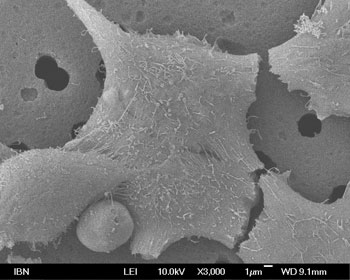 Researchers at the Institute of Bioengineering and Nanotechnology have successfully generated human kidney cells from human embryonic stem cells in vitro. Specifically, they produced the renal cells under artificial conditions in the lab without using animals or organs. This has not been possible until now.
Researchers at the Institute of Bioengineering and Nanotechnology have successfully generated human kidney cells from human embryonic stem cells in vitro. Specifically, they produced the renal cells under artificial conditions in the lab without using animals or organs. This has not been possible until now.
Feb 21st, 2013
Read more
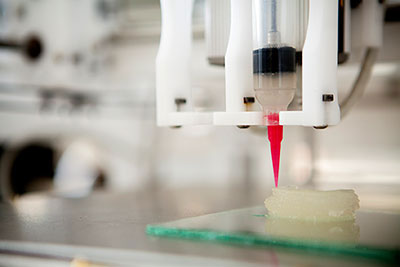 Cornell bioengineers and physicians have created an artificial ear that looks and acts like a natural ear, giving new hope to thousands of children born with a congenital deformity called microtia.
Cornell bioengineers and physicians have created an artificial ear that looks and acts like a natural ear, giving new hope to thousands of children born with a congenital deformity called microtia.
Feb 21st, 2013
Read more
Haifa Shen and Mauro Ferrari led a team of investigators that created a two-stage delivery vehicle capable of ferrying an agent that targets this protein to triple negative breast tumors.
Feb 20th, 2013
Read more
 Biochemists at the University of Massachusetts Amherst recently gained new insight into how protein synthesis and degradation help to regulate the delicate ballet of cell division. In particular, they reveal how two proteins shelter each other in "mutually assured cleanup" to insure that division goes smoothly and safely.
Biochemists at the University of Massachusetts Amherst recently gained new insight into how protein synthesis and degradation help to regulate the delicate ballet of cell division. In particular, they reveal how two proteins shelter each other in "mutually assured cleanup" to insure that division goes smoothly and safely.
 Subscribe to our Biotechnology News feed
Subscribe to our Biotechnology News feed





